
Atlas F1 Magazine Writer
Ahead of the Grand Prix in which Michael Schumacher could equal Alain Prost's record of 51 wins, it's interesting to see that the Frenchman also scored his 51st and final win in Germany. In 13 German Grands Prix, Prost scored two wins, six podiums and 50 points, to become one of the impressive drivers in the modern day German races.
The following year was a completely different experience. Prost had signed for the all-French Renault team, which at first seemed to head for disaster with the heavy and unreliable RE20B. However, as the RE30 was finished, things were getting better and a win in France and a front row start in Britain built high hopes for the German Grand Prix at Hockenheim. Practice proved that things were heading the right way indeed and after the first day, Alain Prost occupied second place behind his teammate Rene Arnoux. Early in the Saturday session, Prost went another half a second faster to beat his teammate and claim provisional pole. With just six laps done, Prost was forced to sit out the remainder of the session. However, nobody got quite close enough to rob his pole time and Alain set his first ever pole position.
On race day, Prost held on to his position at the start, but he had Carlos Reutemann right up his gearbox. Alan Jones in the other Williams quickly followed and captured second place. Prost was doing everything he could to keep the two Williamses behind him, and apart from one attempt from Jones, he was successful in doing so. After 20 laps, halfway through the race, the leading duo came up to Prost's teammate Rene Arnoux, who was about to get lapped. Going into the stadium section, Prost moved to the outside of Arnoux and in a split second, Jones saw a hole on the left of Arnoux and dived in. The Australian emerged as the new leader and immediately showed he was much faster. The World Champion quickly pulled away. This left Prost in second, with Nelson Piquet catching up fast. Just as the Brazilian moved past him, both of them moved past Jones, whose Williams was just about to break down. Prost finished the race in second, bringing him his first podium at the German Grand Prix.
The accident left Prost alone on the front row. This clearly helped third placed Rene Arnoux in gaining the lead and halfway through the first lap Prost was in third with both Arnoux and Piquet ahead of him. Prost kept third for a while, but soon after Patrick Tambay had made his way past him, the Renault engine started misfiring once again and despite an attempt to repair the problem, the race was over for the Frenchman.
1983 was Prost's third and final year with Renault, and this time the reliability was very good. This combined with the usual strength in qualifying provided Prost with a comfortable lead in the Championship by the time the circus came to Germany. Qualifying presented Alain Prost with quite a disappointment. Ending the Friday in fifth was one thing, but being a full two seconds behind the Ferraris was quite unacceptable. However, there was no way of improving his time the next day, as continuous rain made any improvement impossible.
The start of the race was a clean one and everybody started the race in qualifying order. However, it didn't take long for Piquet and Prost to move past Andrea de Cesaris. After ten laps, Prost moved a further position ahead when Patrick Tambay retired from the lead. This situation remained until lap 20, when Prost was the first to go in for fuel and tyres. After the dust settled, the Renault driver found himself in fourth position. After that, he lost fifth gear, something quite essential at the fast Hockenheim track. Subsequently de Cesaris and Patrese moved ahead of him and only late retirements of Cheever and Piquet brought Prost a fourth position in the end.
In 1984, Prost joined McLaren for the second time in his career. With Niki Lauda as his teammate, this was about the best learning school possible. The car was always fast and quite reliable too. Germany was no different, although Friday qualifying didn't bring much good yet. On Saturday everything did go according to plan and Prost scored a pole position just ahead of Elio de Angelis in the Lotus. Alain's start wasn't too good and de Angelis beat him into the first corner. After just seven laps, de Angelis's engine literally went up in smoke, surprising a closely following Alain Prost and allowing Nelson Piquet past into the lead. After 22 laps, Prost was handed another present, as Piquet was forced to retire with his gearbox slowly disintegrating. After that, it was just a matter of bringing the car home for Alain Prost. He did the job well, grabbing the victory and heading a McLaren one-two.
The next year, Hockenheim was back. McLaren was still as strong as in the previous years, but the progress of the Williams team had come to a level where they were hard to battle against and at all times the favourites. Alain Prost, however, was having the best season of his career, battling for the title with the Williams drivers Mansell and Piquet. First qualifying already showed that the battle was between these two teams, with Rosberg heading the tables, ahead of Mansell, Prost and Piquet. On Saturday things were a bit quicker and luckily for McLaren and Prost, their rivals didn't have a good day. This allowed Alain Prost to move up into second behind his teammate to form an all McLaren front row. The race proved to be an exciting duel between Piquet, Prost, Rosberg and Senna. The positions changed numerous times, especially because everyone was using different pitstop strategies. Piquet was fastest on the track, but his two-stop strategy meant he still was the one chasing the others. However, in the end, he was the laughing one. Towards the end of the race it became clear that both McLarens were running low on fuel and indeed on the final lap both cars grinded to a halt. What was a sure second and third, suddenly turned into a dramatic fifth and sixth.
1987 saw the final year of the McLaren-TAG cooperation, with Alain Prost as reigning World Champion. Although the end of the cooperation between the team and TAG wasn't made official until later, the lack of development throughout the season pretty much said enough. The start of the season was still hopeful, with Prost scored two wins and two thirds in the first six races, but looking back, the British Grand Prix, just before the German race, was a turning point. The Frenchman's engine blew with just 12 laps to go, while lying fourth. First qualifying in Germany was a step in the right direction again, though. Prost managed third fastest time, behind Mansell and Senna and half a second ahead of fourth man Piquet. As had happened so many times before, the Saturday session was worthless because of rain. This time it was a blessing for Prost, of course, as it gave him third on the grid.
The race started off with everyone keeping their position, but before the first lap was done, Senna had grabbed the lead. However, the next lap, the Brazilian dropped to fourth. This put Prost into second, behind Mansell. The two drivers remained as close together as possible and after seven laps, Alain saw his chance and grabbed the lead. Now the parts were reversed and Mansell was the one under the leader's rear wing. This lasted until lap 21 when Alain Prost made his pitstop. Mansell followed three laps later, but the Briton's stop took marginally longer, giving Prost a little breathing room. Another three laps later and Prost could give his rear view mirrors a rest. Mansell had disappeared behind him, suffering from a broken engine. This left Prost with a lead of nearly 30 seconds over Nelson Piquet. His third win of the year appeared safe, but nothing was further from the truth. However, it wasn't Piquet who spoiled things, but the McLaren. With a mere five laps to go, the red and white car came to a halt, suffering a broken alternator.
1989 brought Formula One more of the same. McLaren still dominated with great ease, but the worsening relationship between its two drivers made things not quite as superb as the year before. As was to be expected, Senna was the stronger driver in qualifying, claiming no less than 13 poles, and starting all his races from the front row. In Germany things were just like that, although qualifying second a full second behind his teammate and rival didn't put Prost in the best of moods. In the race, the two McLaren drivers were dominating like the year before. Prost only briefly dropped to fourth because of his early stop, but after everyone had done their stop, the Frenchman was leading the race. However, that didn't make things easier, as he now had a very determined teammate charging after him. When Prost lost a gear just laps before the end of the race, that sealed the race. Senna blasted by, grabbing the win ahead of Prost and reducing the Frenchman's Championship lead by three points.
What was already clear at the previous German Grand Prix, was that Prost would leave McLaren. He signed with Ferrari, and in that car he returned to Germany. Although the car certainly wasn't a dog, the McLaren domination in qualifying remained very solid. Senna grabbed pole, with his new teammate Gerhard Berger in second. Prost was third, but the gap of one and a half seconds was worrying to say the least. The worries were unjustified, though, as the race become a rather close affair. The McLarens led at first, but Prost was able to follow closely behind. After 16 laps, both Berger and Prost made their pitstop. The Austrian returned in fifth, while Prost came back to the track in seventh, with Thierry Boutsen between them. Most drivers opted for a shorter first stint and a longer second one, so halfway through the race, the positions were almost back to those before the stops. Only Nannini had chosen to stay out as long as possible and was now busy holding up leader Senna as much as possible. For Prost this was of no consequence, as the heavier fuel load in the second part of the race made following the McLarens impossible. Wisely, Prost settled for fourth, making sure Riccardo Patrese didn't come close enough in the end.
However, the Frenchman couldn't get enough and after a year's absence he was back in 1993, now with Williams. Driving the most powerful car on the grid once again certainly was a pleasure for Prost. In Germany he showed that by dominating every single session on Friday and Saturday. With his teammate Damon Hill following closely and the rest in the distance, things looked easy for the race. That proved to be slightly wrong on Sunday. Prost's start was in turtle-style as he barely got off the grid at first. Hill and Schumacher took maximum profit and Prost was stuck in third. Things got worse quickly, as Prost was given a ten-second penalty for missing a chicane after taking evasive action to avoid running into the spinning Martin Brundle. The penalty dropped the Frenchman to sixth after about a quarter distance of the race. However, the Williams was powerful enough and after 17 laps he was back in second. Hill was long gone of course and the Briton's first victory was fully in the bag. Luckily for Prost and very sadly for Hill, the leading Williams's tyre blew with less than two laps remianing, handing Alain Prost his 51st and final victory.
It started in 1980, when Alain Prost was having his first year at McLaren, who were not even a shadow of the present day team in those days. The first qualifying session was in the wet and Prost scored the 16th fastest time, between Mario Andretti in the Lotus and Williams driver Carlos Reutemann. This wasn't as good as his recent qualifying performances, but there was still hope it would be dry on Saturday. Dry it was, but it didn't help a whole lot. The Frenchman moved to 14th place, in the middle of a group of five drivers who qualified within two tenths of a second. As usual, he was ahead of his teammate John Watson, but this time he was also ahead of both struggling Ferraris.
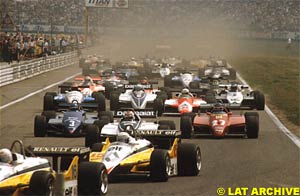 The start of the race wasn't too good. Watson and the always rocketing Gilles Villeneuve got past Prost, and later on the other Ferrari of Jody Scheckter demoted him to 17th. Another lap later and another driver got past, this time Brabham's Nelson Piquet. However, soon enough both Fittipaldis and Hector Rebaque ran into problems, and Prost moved past the ATS of Marc Surer to get back to 15th place. Then Villeneuve had to pit for fresh tyres, followed by Scheckter two laps later. This put Prost in 13th, but with two charging Ferraris to look out for. Soon it became 12th position when Didier Pironi retired, but that was only temporary. A lap later, Prost was 13th again, as the flying Arrows of Jochen Mass made his way past him. That was in fact the turning point in the race, as the only way was down from that point on. Shortly after Villeneuve passed him again, and Prost had to pit, with just ten more laps to go. He resumed the race in last place, from where there was little more to do than drive as fast as possible on fresh tyres and a relatively low fuel load. Eventually, Prost finished the race in a bleak eleventh place.
The start of the race wasn't too good. Watson and the always rocketing Gilles Villeneuve got past Prost, and later on the other Ferrari of Jody Scheckter demoted him to 17th. Another lap later and another driver got past, this time Brabham's Nelson Piquet. However, soon enough both Fittipaldis and Hector Rebaque ran into problems, and Prost moved past the ATS of Marc Surer to get back to 15th place. Then Villeneuve had to pit for fresh tyres, followed by Scheckter two laps later. This put Prost in 13th, but with two charging Ferraris to look out for. Soon it became 12th position when Didier Pironi retired, but that was only temporary. A lap later, Prost was 13th again, as the flying Arrows of Jochen Mass made his way past him. That was in fact the turning point in the race, as the only way was down from that point on. Shortly after Villeneuve passed him again, and Prost had to pit, with just ten more laps to go. He resumed the race in last place, from where there was little more to do than drive as fast as possible on fresh tyres and a relatively low fuel load. Eventually, Prost finished the race in a bleak eleventh place.
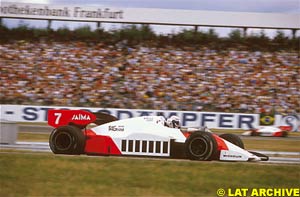 The cooperation with Renault continued in 1982 and after a good start to the season, with back to back victories in South Africa and Brazil, the unreliability struck again. Qualifying was usually no problem, but the engines were very quick to blow up. The second position in Friday's qualifying session as such came as no surprise. Only Ferrari driver Didier Pironi was faster than Prost. On Saturday it soon became clear than the Friday times were final, as rain was falling all day. Most drivers went out to get some wet practice, just in case the race on Sunday would be wet, but times weren't too serious. Just as Prost and Williams driver Derek Daly were on their way back to the pits, a red flash emerged from the spray. Didier Pironi miraculously avoided the Williams, but he was unable to stay away from the Renault. In a thundering clash, the Ferrari ran into the back of Prost, became airborne and somersaulted violently. Prost was unhurt, but Pironi suffered two severely crushed legs, ending his Formula One career.
The cooperation with Renault continued in 1982 and after a good start to the season, with back to back victories in South Africa and Brazil, the unreliability struck again. Qualifying was usually no problem, but the engines were very quick to blow up. The second position in Friday's qualifying session as such came as no surprise. Only Ferrari driver Didier Pironi was faster than Prost. On Saturday it soon became clear than the Friday times were final, as rain was falling all day. Most drivers went out to get some wet practice, just in case the race on Sunday would be wet, but times weren't too serious. Just as Prost and Williams driver Derek Daly were on their way back to the pits, a red flash emerged from the spray. Didier Pironi miraculously avoided the Williams, but he was unable to stay away from the Renault. In a thundering clash, the Ferrari ran into the back of Prost, became airborne and somersaulted violently. Prost was unhurt, but Pironi suffered two severely crushed legs, ending his Formula One career.
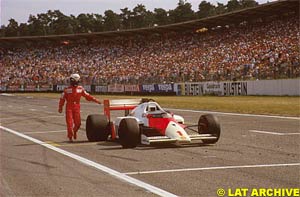 For 1985, the German Grand Prix moved to the new Nurburgring, where qualifying brought a surprising polesitter in the form of Teo Fabi. Against all odds, the Toleman driver claimed pole ahead of Johansson and Prost. What followed was a rather uneventful race. The start was complete chaos, ending with Rosberg leading, ahead of Senna, Alboreto, de Angelis and Prost. Only the retirements of Senna, de Angelis and Rosberg made a change and Prost finished second without having do to a whole lot for it.
For 1985, the German Grand Prix moved to the new Nurburgring, where qualifying brought a surprising polesitter in the form of Teo Fabi. Against all odds, the Toleman driver claimed pole ahead of Johansson and Prost. What followed was a rather uneventful race. The start was complete chaos, ending with Rosberg leading, ahead of Senna, Alboreto, de Angelis and Prost. Only the retirements of Senna, de Angelis and Rosberg made a change and Prost finished second without having do to a whole lot for it.
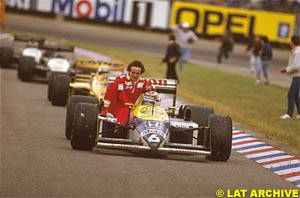 The following season, 1988, was the year of total domination for the McLaren team. With upcoming superstar Ayrton Senna now partnering Alain Prost and with the Honda power source that had brought Williams so much in the previous few years, things simply couldn't go wrong. In a season in which McLaren scored 15 wins and 15 poles, it came as no surprise at all that the front row for the German Grand Prix consisted of Senna and Prost, in that order. The start of the race put Prost back to fourth, with Gerhard Berger and Alessandro Nannini blasting by in the first lap. This was only temporary, as the McLaren was so much more powerful that the other cars. After eight laps Prost passed Nannini and some three laps later, Berger also had to settle behind the McLaren. However, Senna was gone by now and Prost had only second place to bring home, which he did.
The following season, 1988, was the year of total domination for the McLaren team. With upcoming superstar Ayrton Senna now partnering Alain Prost and with the Honda power source that had brought Williams so much in the previous few years, things simply couldn't go wrong. In a season in which McLaren scored 15 wins and 15 poles, it came as no surprise at all that the front row for the German Grand Prix consisted of Senna and Prost, in that order. The start of the race put Prost back to fourth, with Gerhard Berger and Alessandro Nannini blasting by in the first lap. This was only temporary, as the McLaren was so much more powerful that the other cars. After eight laps Prost passed Nannini and some three laps later, Berger also had to settle behind the McLaren. However, Senna was gone by now and Prost had only second place to bring home, which he did.
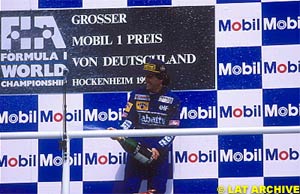 In 1991 Alain was still driving for Ferrari. In qualifying, he assumed a common role of "best of the rest", as both Williams and McLaren were miles ahead of the competition. The top four settled within three tenths of a second, while number five Prost was a whisker short of two seconds behind, just eight thousandths ahead of his teammate Jean Alesi. The race then saw utter domination by Nigel Mansell in the Williams, while Berger, Senna, Prost, Patrese and Alesi fought a close fight far behind. Berger was the first to stop and his longer than long pitstop put him out of competition for a podium spot right away. Next into the pits were arch rivals Prost and Senna. The stop didn't make a difference and both drivers remained extremely close, with Senna having the minimal edge. Patrese followed a while later, getting a much better second set of tyres. Prost's fight with Senna abruptly ended after 37 laps. The Frenchman spun off, subsequently blaming Senna for braking on the straights and other bad conduct. This led to Prost being warned by FISA and ultimately to Prost leaving Ferrari and Formula One altogether.
In 1991 Alain was still driving for Ferrari. In qualifying, he assumed a common role of "best of the rest", as both Williams and McLaren were miles ahead of the competition. The top four settled within three tenths of a second, while number five Prost was a whisker short of two seconds behind, just eight thousandths ahead of his teammate Jean Alesi. The race then saw utter domination by Nigel Mansell in the Williams, while Berger, Senna, Prost, Patrese and Alesi fought a close fight far behind. Berger was the first to stop and his longer than long pitstop put him out of competition for a podium spot right away. Next into the pits were arch rivals Prost and Senna. The stop didn't make a difference and both drivers remained extremely close, with Senna having the minimal edge. Patrese followed a while later, getting a much better second set of tyres. Prost's fight with Senna abruptly ended after 37 laps. The Frenchman spun off, subsequently blaming Senna for braking on the straights and other bad conduct. This led to Prost being warned by FISA and ultimately to Prost leaving Ferrari and Formula One altogether.
Please Contact Us for permission to republish this or any other material from Atlas F1.
|
Volume 7, Issue 30
Atlas F1 Special
Hakkenheim: Catch Him if You Can
Schumania!
German GP Preview
The German GP Preview
Technical Preview
Focus: Prost in Germany
Columns
The F1 Insider
Elsewhere in Racing
The German GP Quiz
Bookworm Critique
The Weekly Grapevine
> Homepage |